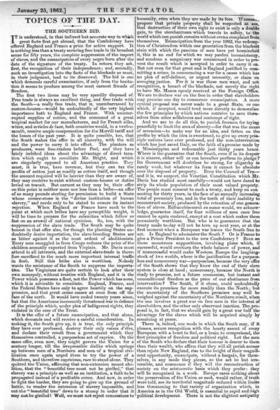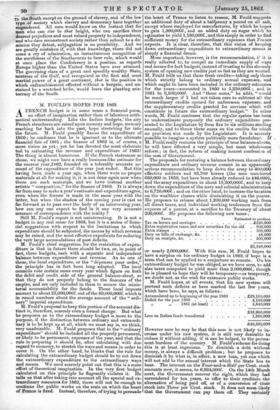TOPICS OF THE DAY
•
THE SOUTHERN BID.
IT is understood, in that indirect but accurate way in which great facts first get abroad, that the Confederacy have offered England and France a price for active support. It is nothing less than a treaty securing free trade in its broadest sense for fifty years, the complete suppression of the impart of slaves, and the emancipation of every negro born after the date of the signature of the treaty. In return they ask, first, the recognition of their independence ; and, secondly, such an investigation into the facts of thel blockade as must, in their judgment, lead to its disavowal. The bid is one which demands careful examination, if only from the hesita- tion it seems to produce among the most, earnest friends of freedom.
The first two items may be very speedily disposed of. Free trade is always an excellent thing, and free trade with the South—a really free trade, that is, unembarrassed by custom-houses—would be undoubtedly of the vety highest importance both to England and France. With uninter- rupted supplies of -cotton, and the command of a great • tropical market for our manufactures, and for French silks, wines, and articles de luxe, both countries would, in a twelve- month, receive ample compensation for the Morrill tariff and the losses of the past year. It is quite possible, too, that the South makes the offer in all sincerity, with the will and the power to carry it into effect. The planters •as producers, were free-traders before Peel, and they have lately imbibed ideas about the advantage of direct taxa- tion which ought to conciliate Mr. Bright, and which are singularly opposed to all American practice. They must, it is true, have revenue, but they can tax the profits of cotton just as readily as cotton itself, and though the amount required will be heavier than they are aware of, they may contrive to exist without custom-houses or duties levied on transit. But earnest as they may be, their offer on this point is neither more nor less than a bribe—an offer of so many pounds sterling for permission to build a 'State whose corner-stone is the "divine institution of human slavery," and needs only to be stated to ensure its instant rejection. When England or France have sunk to the point at which such bribes have any perceptible weight, it will be time to prepare for the calamities which follow so fast on an avowal of national cynicism. So, too, with the suppression of the slave trade. The South may be quite honest in that offer also, for though the planting States un- doubtedly desire importation, the slave-breeding States are as bitter against it as the most ardent of abolitionists. Every man smuggled in from Congo reduces the price of the children annually exported from Virginia. Mr. Davis must attend to all interests, and the external slave-trade is there- fore sacrificed to the much more important internal traffic in flesh. Still this bribe also is worthless. Nobody wants the assistance of the South to suppress the importa- tion. The Virginians are quite certain to look after their- own monopoly, without treaties with England, and it is the Power which possesses a fleet, not the Power which has none, which it is advisable to conciliate. England, France, and the Federal States have only to agree heartily on the sup- pression, and that great crime ceases at once from off the face of the earth. It would have ended twenty years since, but that the Americans incessantly threatened war in defence of the principle which, under plea of belligerent rights, they .violated in the case of the Trent.
It is the offer of a future emancipation, and that alone, which demands and will receive a careful consideration. In making it, the South give up, it is true, the only principle they have ever professed, destroy their only raison d' etre, and declare their revolt from a government which they themselves controlled, a purposeless act of caprice. On the same offer, even now, they might govern the Union for a century longer, till the irrepressible dislike which springs up between men of a Northern and men of a tropical civi- lization once again urged them to try the power of a Southern, and therefore capricious, race to stand alone. They quitted the Union, affirming that non-extension meant abo- lition, that the "beautiful tree must not be girdled," that slavery was a principle as well as an institution, a faith to be propagated instead of a profitable crime. And now, in order to fight the harder, they are going to give up the ground of battle, to render the extension of slavery impossible, and cut the "beautiful tree" down to a stump in order that it may not be girdled ! Well, we must not reject concessions to humanity, even when they are made by its foes. If corsau... propose that private property shall be respected at sea, that destruction of their own right to exist is only a double gain, to the nierchantman which travels in safety, to the world which can punish corsairs without even a complaint from themselves. Emancipation from the year 1862, the redemp- tion of Christendom within one generation from the blackest stain with which the passions of men have yet besmirched it, this is an end for which we may pardon inconsistency, and condone a sanguinary war commenced in order to pre- vent the result which is accepted in order to carry it on. But not even for that great end is England justified in com- mitting a crime, in commencing a war for a cause which has no plea of self-defence, or urgent necessity, or claim on avenging justice. For it is war these men want, and not recognition, a breach of the blockade, not merely the right to have Mr. Mason openly received at the Foreign Office. We are to declare war on the free in order that slaveholders may promise one day to commence emancipation. A more cynical proposal was never made to a great State, or one which, if accepted, would tend more directly to demoralize the few principles by which nations contrive to save than- selves from utter selfishness and contempt of right. And we are to do all this, to punish freemen for trying peacefully-to limit the area of slavery—for that was the cause of secession—to make war for an idea, and fatten on the profits by which the idea is sweetened, to give up every prin- ciple nations have ever professed, and the non-intervention which has just saved Italy, on the faith of a promise made by a Mississippian and redeemable just thirty years hence. Where is the guarantee that the South, even if in its despair it is:sincere, either will or can hereafter perform its pledge? Its Government will doubtless be strong, for oligarchy is rarely weak, but whatever its form it cannot be absolute over the disposal of property. Even the Council of Ten— and it is, we suspect, the Venetian Constitution which Mr. Davis has studied most carefully—would not have dared to strip its whole population of their most valued property. The people must consent to such a treaty, and keep on ton senting for thirty years, in the face of an annually increasing total of pecuniary loss, and in the teeth of their inability to reconstruct society, produced by the retention of one genera- tion of slaves. Enfranchisement en masse would, we acknow- ledge, guarantee .itself, for four millions of men once free cannot be again enslaved, except at a cost which makes them pecuniarily worthless. But who is to guarantee that the treaty made to-day will not be torn up next year, or at the first moment when a European war leaves the South free to act. Is England to administer the South ? Or is France to give a Prince President to the new Confederacy ? Even an those monstrous suppositions, involving plans which, if successful, would overturn the whole balance of power, and if unsuccessful would make Western Europe the laughing- stock of two worlds, where is the justification for a purpose- less and unnecessary war—purposeless, because the very offer of the South shows that they know the end of their slave system is close at hand ; unnecessary, because the North is ready to promise not a future concession, but instant and unconditional freedom as the price of our abstinence from intervention ? The South, if it chose, could undoubtedly execute its promises far more readily than the North ; but the .uncertainty of the Southern promises may well be weighed against the uncertainty of the Northern result, when the one involves a great war on free men in the interest of slaveholders, and the other only observant inaction. The pro- posal is, in fact, that we should gain by a great war half the advantage for the slaves which will be acquired simply by remaining at peace.
There is, indeed, one mode in which the South may, if it pleases, secure recognition with the hearty assent of every European with a heart to feel, or a brain to comprehend, the first principles of freedom and political right. Let the men of the South who declare that their honour is dearer to them than their wealth, who affirm that they will all perish sooner than rejoin New England, rise to the height of their magnifi- cent opportunity, emancipate, without a bargain, for them- selves, in any mode they please, so the act be but irre- versible, and commence if they will the reconstruction of society on the aristocratic basis which they prefer: they will be recognized in a week. Europe cares nothing about the preservation of the Union as such, would rather, if truth were told, see its territorial magnitude reduced within limits less threatening to that variety of organization which, in America as in the Old World, is essential to rapid andshigh political development. There is not the slightest antipathy TIr the South except on the ground of slavery, and of the low type of society which slavery and democracy have together engendered. All men would know on the instant that for men who can rise to that height, who can sacrifice their dearest prejudices and most valued property to independence, and who dare reconstruct society rather than' submit to a do- minion they detest, subjugation is no possibility. And we are greatly mistaken if, with that knowledge, there did not come a cry of admiration, an instantaneous recognition of the worthiness of the Southerners to bear rule, which would at once place the Confederacy in a position as regards Europe higher than the United States have ever attained. The governing class of a great and speedily wealthy State, mistress of the Gulf, and recognized as the first and most martial power of a great continent, that is the position in which enfranchisement effected without a bargain, and un- stained by a wretched bribe, would leave the planting aris- tocracy of the South.































 Previous page
Previous page